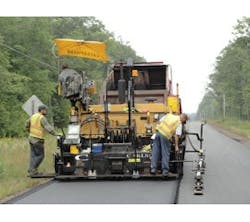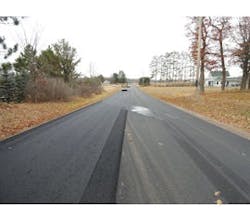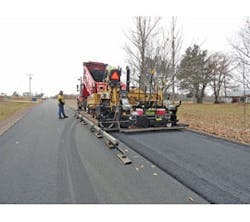By: Courtney Sullivan
The harsh winters and colder temperatures experienced in northern Wisconsin can have a significant negative impact on long-term performance of asphalt pavements. Cold weather contraction and brittleness of asphalt driving surfaces can result in cracking and other defects. As a result, cities and counties in northwestern Wisconsin have been eager to experiment with warm-mix asphalt (WMA) technologies, which offer enhanced cold-weather performance and other advantages over traditional hot-mix asphalt (HMA).
Strong recommendation
When Monarch Paving Co., a division of Mathy Construction Co., approached transportation infrastructure agencies in northwestern Wisconsin with the concept of repaving with WMA, agency officials viewed it with great interest as a more economical, environmentally friendly and easy-to-use alternative in dealing with their asphalt pavements in need of repair and replacement, and, more specifically, in dealing with the high incidence of cold-weather cracking.
At the recommendation of their asphalt supplier, the counties experimented with WMA containing the warm-mix additive Evotherm. The use of Evotherm allowed a mix temperature of 240ºF, which is 60ºF to 90ºF cooler than typical hot-mix temperatures. In addition to the savings on process fuel used during production, the reduction in carbon emissions and the enhancements to the comfort of county paving crews, the lower mix temperatures resulted in significantly less oxidization of the asphalt cement. At typical hot-mix temperatures, oxidization causes the asphalt cement to lose elasticity, contributing to premature aging and transverse cracking. As a method of comparison on initial Evotherm WMA projects, the county paving crew paved one lane of a two-lane road with WMA and the other lane with a traditional HMA. Comparative checks of these sections conducted in subsequent years showed a 50% decrease in the number of observed thermal cracks in pavements paved with WMA compared to HMA placed at the same time. This at a time when Wisconsin has experienced some of the harshest winters on record.
In 2010, the Sawyer County Highway Department was the first agency in the region to utilize WMA with Evotherm supplied by Monarch Paving. According to Gary Gedart, Sawyer County Highway Commissioner, improvements in pavements constructed with WMA have been calculable. While Sawyer County does not maintain crack-count data, Gedart observed that roads constructed with WMA have exhibited notably less cracking than Sawyer County roads paved with HMA. Additionally, with work that needs to be completed at colder ambient temperatures and with higher moisture content in aggregates, Gedart added that Evotherm is essential to assure proper coating of aggregate.
Last season’s long winter and cold temperatures, combined with a wet May and June, resulted in a 2014 paving season that went well into October. This made the improved cold-weather compaction properties of Evotherm an important quality for Sawyer County paving crews. Having used warm mix successfully for more than four years, Sawyer County has made WMA their asphalt material of choice.
“We’re very happy with it. We only bid warm mix this year for the first time. Our crews like working with it, and it’s more environmentally friendly,” Gedart said.
If it’s good enough for them . . .
Washburn County noted the pavement improvements seen in neighboring Sawyer County and followed suit. Jon Johnson, Washburn County Commissioner, was concerned with the performance of his asphalt pavements when it came to transverse cracking, so he decided to try something new.
As a result, Johnson selected a section of Washburn County Road A that had exhibited problems with cracking of the asphalt-driving surface. This project was paved in cool ambient temperatures, ranging from the upper 30s to low 40s.
“The asphalt rolled out good and set up great. The warm-mix asphalt with Evotherm had better density and easier compaction than hot-mix asphalt laid in the middle of the summer,” Johnson said.
An inspection of the work on County Road A conducted the following spring revealed that there had been a significant decrease in thermal cracking. Johnson observed that the warm-mix roads have exhibited roughly 50% fewer cracks per a given length of roadway than roads paved with hot mix. Of the crack performance on the County A project, he stated, “After four tough winters, it has fewer cracks than the hot-mix roads that we paved last year.”
Johnson also believes that the key to better crack resistance is that, by using a warm-mix additive such as Evotherm, the asphalt cement is not subjected to the accelerated aging effects of the high temperatures required in the hot-mix process. The lower temperatures have resulted in other benefits as well. Johnson noted, “Our operators like it because there are less emissions at the paver.”
Jim Anderson, Community Services Director of the city of Rice Lake, initially became interested in warm-mix technology after reading about it in industry journals. After hearing the positive experiences many nearby county road commissioners were having with warm-mix projects, he approached Monarch Paving Co., initiating city of Rice Lake’s use of WMA with Evotherm.
These projects have had positive results. According to Anderson, WMA placed on city streets during the past three paving seasons has shown superior performance to HMA placed during the same period. Anderson noted that the streets being compared were all built with the same materials and processes, with the only exception being warm-mix versus hot-mix asphalt driving surfaces. Even previously problematic areas have improved with use of the warm-mix technology.
Anderson specifically mentioned that Hilltop Drive had a history as an extremely difficult street for asphalt paving due to having been constructed over clay and wet springs. The WMA processed with Evotherm has held up especially well on Hilltop.
The lower mix temperatures have many added benefits. Anderson believes that by using lower production temperatures, much of the aging effect to asphalt cements that can occur at hot-mix production temperatures is avoided. Anderson has observed that asphalt produced at warm-mix temperatures exhibits better crack resistance and better adhesion.
In the harshest of conditions
Even when this northern Wisconsin region was experiencing the harshest winters in recent history, Sawyer County, Washburn County and the city of Rice Lake have experienced measurable improvements in the long-term performance of pavements constructed with Evotherm WMA. This has resulted in expanded use and, in the case of Sawyer County, exclusive specification of WMA on all county repave projects. The combination of increased durability, reduced environmental impact, enhanced ease of use and improved cold-weather compaction makes WMA the best solution for northern Wisconsin’s most difficult paving applications. AT
About The Author: Sullivan is marketing coordinator for InVia Pavement Technologies.






